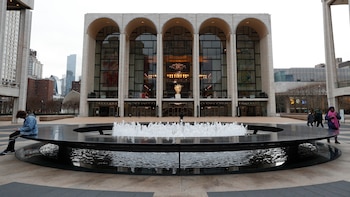
8th Asian Winter Games Coverage Proudly Sponsored by the Olympic Council of Asia
(ATR) Abundant snowfall transformed Sapporo into a winter wonderland as the Asian Winter Games came to a close at Makomanai Skating Arena.
The Crown Prince of Japan Kotaishi Naruhito attended the two-hour closing ceremony that included performances by all figure skating medalists.
"It is my sincere hope that the future Asian Winter Games will give hopes and dreams to the children and future generations," said the Japanese Crown Prince, addressing athletes, officials and guests. "I also wish that the Asian Winter Games will keep promoting not only winter sports, but also international friendship and world peace throughout the world,"
Acting Olympic Council of Asia president Timothy Fok declared the 8th edition of the Asian Winter Games closed.
"Sayonara Sapporo," Fok said, before Japanese Olympic Committee president Tsunekasu Takeda returned the OCA flag and the flame was extinguished.
Both the Games and the growth of winter sport in Asia have come leaps and bounds since the inaugural edition in Sapporo in 1986, said Olympic Council of Asia and Japanese sport officials at a morning news conference.
A record 1,152 athletes representing 32 nations showcased their skills and talent on snow and ice over seven days of competition amid snow and below freezing temperatures in the 1972 Winter Olympic city.
Sapporo organizing committee president Katsuhiro Akimoto emphasized the magnitude of the changes since the inaugural edition of the Games in Sapporo in 1986.
"At that time the Games were started with only seven member nations of the OCA that were familiar with winter sport, but with economic growth and the technology to make snow and ice we’ve come a long way," said Akimoto, also the mayor of Sapporo.
"Now there are indoor ski slopes in the Middle East and indoor skating rinks in cities in Asia, so the Asian Winter Games have grown to be a large scale sporting event," he said.
OCA honorary life vice president Wei Jizhong commended the Japanese organizers, shared colorful anecdotes about competitors from warm weather nations and thanked the citizens of Sapporo.
"The Sapporo people liked the games, supported the Games and attended the Games," said the Chinese OCA official.
Wei proclaimed that Sapporo 2017 was the largest Asian Winter Games in history in terms of "NOC’s, athletes, events and atmosphere."
He said that the international sport federations were "generally satisfied."
"The international ski federation technical delegate told me he was very surprised to see that the amount of Asian skiers have increased and participated, even if the level was not very high – they came for competing, not medals," Wei said.
The Sapporo mayor said the Games showcased not only the city, but also the entire northern Japanese island of Hokkaido.
"Through TV and the internet, we were able to show the world the attractiveness of winter sports and Hokkaido is a home for winter sport," Akimoto said.
He confidently alluded to the possibility of Sapporo once again hosting the Winter Olympics.
"We are highly evaluated by various people and the city is highly capable of hosting international competitions," Akihito said. "This time it was a large scale Games and when we invite the Olympics and Paralympics, it will be even larger scale, but the Asian Winter Games have given us experience."
Kazakhstan and Japan Skate For Ice Hockey Gold
Kazakhstan’s men’s hockey team was too strong and skilled as they defeated tournament host Japan, 7-0, in the final game at Tsukisamu Gymnasium.
Arriving in Sapporo as the highest internationally ranked nation – 16th in the IIHF world standings – the Kazakhs went undefeated in three games to win the Asian Winter Games gold medal.
South Korea, who will participate at home in PyeongChang next winter, won the silver medal with a record of 2-1 while Japan, 1-2, took bronze. China was winless as the fourth team in the round-robin tournament.
On Saturday night, the Japanese ladies instantly became media darlings, skating to a gold medal on home ice in Sapporo. The AWG tournament served as a valuable tune-up for Japan, who will compete in PyeongChang 2018.
Written and reported in Sapporo by Brian Pinelli.
Últimas Noticias
Utah’s Olympic venues an integral part of the equation as Salt Lake City seeks a Winter Games encore
Utah Olympic Legacy Foundation chief of sport development Luke Bodensteiner says there is a “real urgency to make this happen in 2030”. He discusses the mission of the non-profit organization, the legacy from the 2002 Winter Games and future ambitions.

IOC president tells Olympic Movement “we will again have safe and secure Olympic Games” in Beijing
Thomas Bach, in an open letter on Friday, also thanked stakeholders for their “unprecedented” efforts to make Tokyo 2020 a success despite the pandemic.

Boxing’s place in the Olympics remains in peril as IOC still unhappy with the state of AIBA’s reform efforts
The IOC says issues concerning governance, finance, and refereeing and judging must be sorted out to its satisfaction. AIBA says it’s confident that will happen and the federation will be reinstated.

IOC president details Olympic community efforts to get Afghans out of danger after Taliban return to power
Thomas Bach says the Afghanistan NOC remains under IOC recognition, noting that the current leadership was democratically elected in 2019. But he says the IOC will be monitoring what happens in the future. The story had been revealed on August 31 in an article by Miguel Hernandez in Around the Rings

North Korea suspended by IOC for failing to participate in Tokyo though its athletes could still take part in Beijing 2022
Playbooks for Beijing 2022 will ”most likely” be released in October, according to IOC President Thomas Bach.




